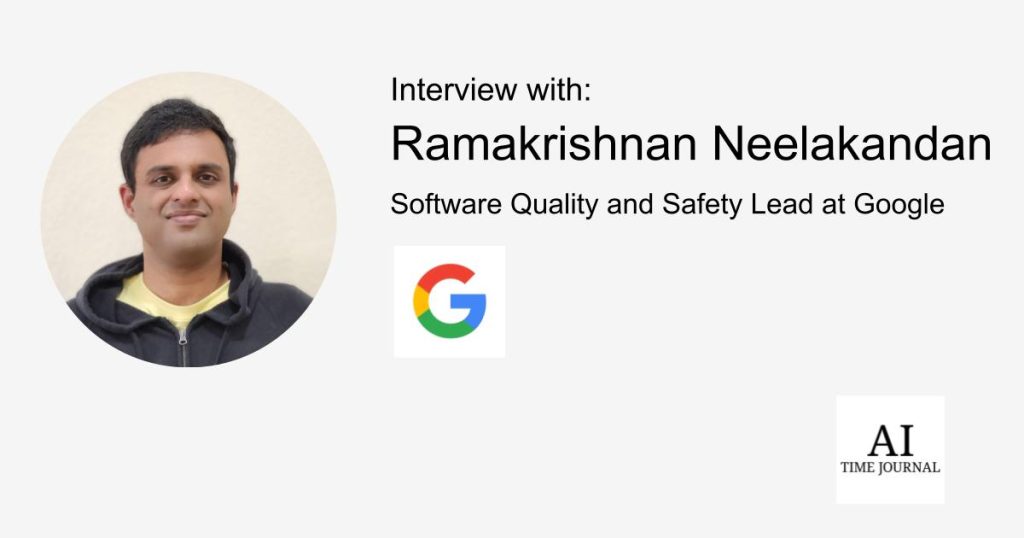
Ramakrishnan Neelakandan, Software Quality and Safety Lead at Google envisions a transformative decade for AI in healthcare. He foresees AI evolving beyond simple automation to revolutionize personalized and predictive medicine. Picture AI systems analyzing genetic makeup, lifestyle, and biomarkers to predict and prevent diseases like diabetes. AI-powered imaging will detect early signs of cancer, enabling life-saving interventions. This evolution will augment human capabilities, improving patient outcomes and personalizing drug dosages, guiding surgeries, and providing virtual health coaching. However, ensuring quality and safety is paramount. Neelakandan emphasizes rigorous validation using diverse datasets, real-world scenario simulations, and the necessity for transparent, interpretable AI algorithms to build trust. Strong data privacy and continuous monitoring are essential to avoid biases and ensure equitable healthcare. Neelakandan’s insights highlight the critical balance between innovation and stringent quality standards, setting a clear path for the future of AI in healthcare.
How do you see the role of AI evolving in the healthcare sector over the next decade, especially in terms of quality and safety?
The next decade will see AI transform healthcare, moving beyond simple automation to truly personalized and predictive medicine. Imagine AI systems that analyze your genetic makeup, lifestyle, and early biomarkers to predict your risk of developing diabetes, allowing for targeted interventions to prevent the disease. This kind of proactive approach, where AI helps us anticipate and address health risks before they become serious, is incredibly exciting. AI-powered imaging analysis will detect subtle signs of cancer that might be missed by human eyes, leading to earlier interventions and potentially saving lives. This is where AI can truly shine, augmenting human capabilities and improving patient outcomes. AI will also personalize drug dosages, guide surgical procedures, and even provide virtual health coaching, empowering patients to take a more active role in their health management. This shift towards patient-centered care, where AI acts as a partner in health management, is a positive development.
However, ensuring quality and safety is paramount. We must rigorously validate AI models using diverse datasets, simulating real-world scenarios to ensure accuracy and reliability. This is crucial, as AI models trained on limited or biased datasets can lead to inaccurate diagnoses and inappropriate treatment recommendations. Transparency is key: AI algorithms must be interpretable, allowing healthcare professionals to understand the reasoning behind their recommendations. This is essential for building trust and ensuring that healthcare professionals can confidently rely on AI-driven insights. Strong data privacy and security measures are essential, and we must continuously monitor AI systems in real-world settings to identify and address potential biases. This is crucial to ensure that AI systems are not perpetuating existing inequalities in healthcare and that they are used in a fair and equitable manner.
In your experience, what are the most critical factors to consider when ensuring regulatory compliance for medical AI products?
Ensuring regulatory compliance for medical AI is complex but crucial. It’s essential to prioritize data privacy and security, utilizing techniques like federated learning to protect sensitive patient information. Transparency is key: AI algorithms must be explainable, allowing regulators to understand how they work. This is crucial for building trust and ensuring that regulators can confidently assess the safety and efficacy of AI-powered medical devices. Rigorous clinical trials are essential to demonstrate the effectiveness and safety of AI-powered medical devices, and we must have robust pre-market approval processes and post-market surveillance systems to ensure ongoing safety and efficacy. This is essential to ensure that AI-powered medical devices are safe and effective for patients and that they meet the highest standards of quality.
How do you think the role of a Global Fellow for AI 2030 would influence your approach to developing quality and safety standards?
Drawing from my experience as a Global Fellow for AI 2030, I would prioritize global collaboration, ethical considerations, and responsible AI development. I would advocate for building trustworthy AI systems that are not only accurate but also explainable, verifiable, and unbiased. This is essential to ensure that AI systems are used in a responsible and ethical manner, promoting fairness and equity in healthcare. I would actively engage with stakeholders worldwide to ensure AI development aligns with global ethical norms and regulatory frameworks. This is crucial to ensure that AI development is guided by shared values and that it benefits all of humanity. I would also contribute to the development of international standards for AI in healthcare, promoting interoperability and harmonizing regulations across different regions. This is essential to ensure that AI systems can be seamlessly integrated into healthcare systems worldwide and that they meet the highest standards of quality and safety.
What strategies would you employ to maintain high standards of quality in AI products while managing the rapid pace of technological advancements?
I would embrace agile development methodologies, allowing for rapid incorporation of new advancements while continuously testing and validating for quality assurance. This is essential to ensure that AI systems are constantly evolving and improving, keeping pace with the rapid advancements in the field. I would implement automated testing pipelines to catch potential issues early, and I would cultivate a culture of quality-first thinking within the team, promoting collaboration and shared responsibility. This is crucial to ensure that quality is ingrained in every aspect of the development process and that everyone on the team is accountable for delivering high-quality products.
How would you balance the need for innovation with the stringent requirements of regulatory compliance in the healthcare AI field?
It’s crucial to actively engage with regulatory bodies from the early stages of development, ensuring our solutions are designed with compliance in mind. This is essential to ensure that AI systems are developed in accordance with all relevant regulations and standards. I would employ a risk-based approach, proactively addressing potential safety issues and algorithmic bias. This is crucial to ensure that AI systems are safe and effective for patients and that they do not perpetuate existing inequalities in healthcare. I would stay abreast of evolving regulations and standards, constantly updating my knowledge and adapting my processes to ensure compliance. This is essential to ensure that AI systems remain compliant with the latest regulations and that they are developed in a responsible and ethical manner.
Can you discuss the impact of automation on business processes within the healthcare industry and how it affects overall product quality?
Automation is transforming healthcare, streamlining repetitive tasks and allowing staff to focus on higher-value activities like patient care. AI-powered systems can analyze large datasets, leading to more informed decision-making and personalized treatment plans. This is essential to ensure that healthcare professionals have access to the information they need to make the best possible decisions for their patients. Automation can also reduce human error, improving accuracy and patient safety. This is crucial to ensure that patients receive the correct diagnoses and treatments and that they are not harmed by medical errors.
However, it’s important to ensure staff are adequately trained to utilize and monitor automated systems, and we must carefully plan for workflow optimization to avoid disruptions. This is essential to ensure that AI systems are integrated seamlessly into existing healthcare workflows and that they do not create new problems or inefficiencies.
What are the key components of an effective quality assurance program for AI/ML products in the healthcare domain?
An effective QA program must include rigorous validation using diverse datasets and real-world simulations to ensure accuracy and reliability. This is essential to ensure that AI systems are robust and reliable and that they can handle a wide range of real-world scenarios. We must ensure training data is accurate and representative to prevent bias. This is crucial to ensure that AI systems are fair and unbiased and that they do not perpetuate existing inequalities in healthcare. AI algorithms must be explainable, allowing healthcare professionals to understand their reasoning. This is essential for building trust and ensuring that healthcare professionals can confidently rely on AI-driven insights. Finally, we must continuously monitor AI systems in real-world settings to identify and address potential issues. This is essential to ensure that AI systems are constantly improving and that they are used in a safe and effective manner.
How would you approach collaboration with engineers, product managers, and regulatory bodies to ensure the successful implementation of quality programs?
It’s crucial to maintain open and transparent communication with all stakeholders, ensuring alignment on quality goals. This is essential to ensure that everyone is working towards the same goals and that there is a shared understanding of the importance of quality. I would foster a culture of shared responsibility for quality, empowering teams to own their work and provide feedback. This is crucial to ensure that everyone is accountable for delivering high-quality products. I would engage with regulatory bodies from the early stages of development, seeking their input and building trust. This is essential to ensure that AI systems are developed in accordance with all relevant regulations and standards.
What advice would you give to professionals entering the field of healthcare AI with regards to ensuring both innovation and safety in their products?
Always prioritize patient safety. This is the most important consideration when developing AI systems for healthcare. Develop AI solutions that are ethical, fair, and unbiased. This is essential to ensure that AI systems are used in a responsible and equitable manner. Engage with experts in healthcare, AI, and regulation to learn best practices. This is essential to ensure that you are developing AI systems that meet the highest standards of quality and safety. Stay updated with advancements in the field, and remember that continuous learning is essential for developing safe and effective AI solutions. This is essential to ensure that you are keeping up with the rapid pace of innovation in the field of healthcare AI.
By following these guidelines, you can contribute to the responsible development and deployment of AI in healthcare, ensuring that technology is used to improve patient care and outcomes while minimizing risks and promoting ethical practices.

 5 months ago
56
5 months ago
56







 English (US) ·
English (US) ·